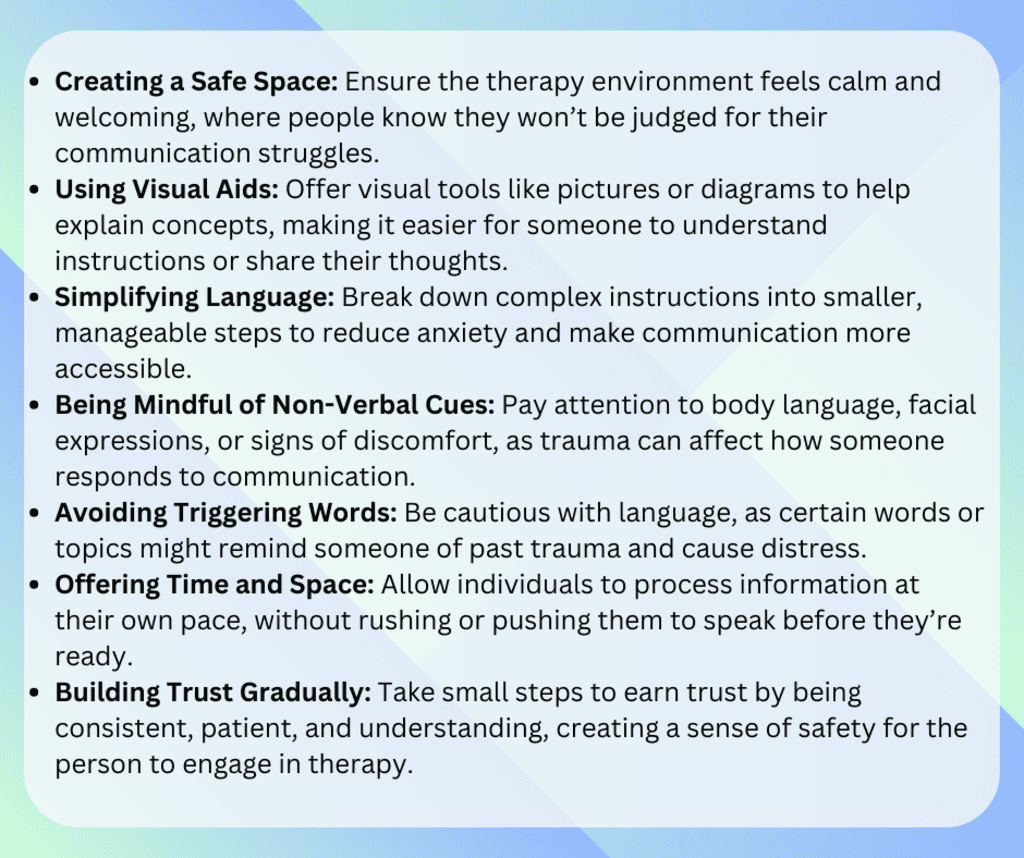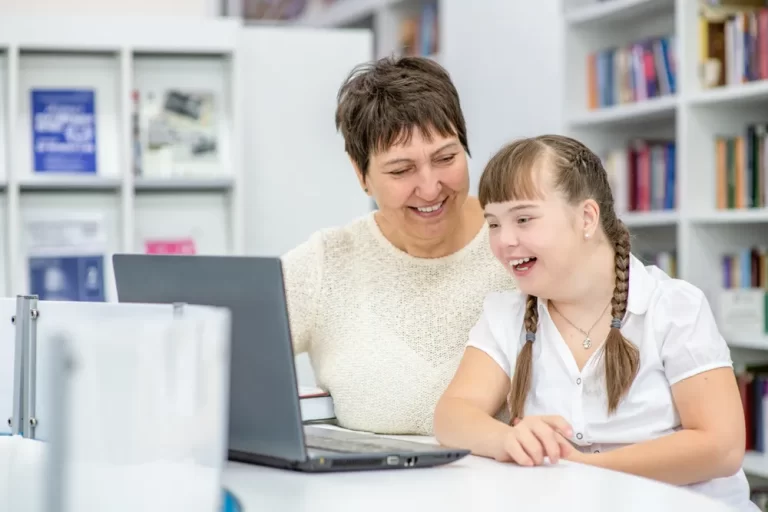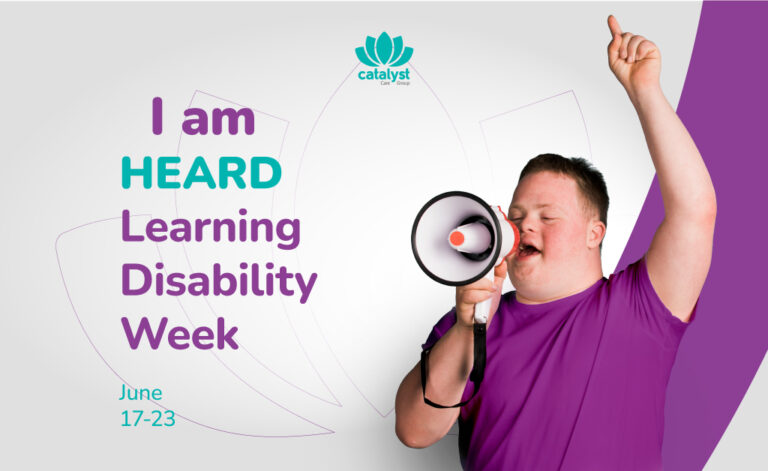Feeling heard starts with feeling safe.
Communication isn’t just about speaking- it’s about feeling valued and understood. At any point in life, nearly 1 in 5 people may face communication challenges that can affect their ability to form meaningful connections with others. For people who have experienced trauma, expressing thoughts and emotions can feel overwhelming, sometimes even impossible.
Speech and language therapy goes beyond words; it’s about understanding the person behind them. By integrating trauma-informed care, we create a space where trust is built, support is felt, and communication becomes a path to healing, not just expression.
Introduction to Trauma-informed Practice
Trauma-informed practice is an approach that recognises the widespread impact of trauma on people’s lives and focuses on creating a safe, supportive environment for healing. In mental health services, this approach is crucial as it helps professionals understand how past traumatic experiences can affect behavior, emotions, and overall well-being.
As a speech and language therapist in this setting, it’s important to approach care with an understanding of how trauma influences communication. Trauma can impact a person’s ability to process information, express themselves, or engage in social interactions, which makes communication support a vital part of the recovery process.
By providing a compassionate environment, speech and language therapists help people express themselves at their own pace and use different strategies to support speech, language, and social communication.
By recognising the effects of trauma and responding with sensitivity, speech and language therapists help build trust, foster positive interactions, and support people in their recovery journey, enabling them to regain the confidence to communicate and connect with others.
Definition and Scope of Speech and Language Therapy
Speech and language therapy provides tailored support to children and adults facing challenges with communication or difficulties related to eating, drinking, and swallowing.
For people who struggle to express thoughts or understand others, therapy helps unlock the potential to connect meaningfully with the world around them. It addresses specific needs such as speech clarity, language development, and social communication, empowering people to engage more fully in daily life.
For people with swallowing difficulties, therapy ensures safer eating and drinking, reducing risks and helping regain confidence in the ability to care for oneself. Ultimately, speech and language therapy is about supporting autonomy, self-expression, and dignity.
SLTs are healthcare professionals who work closely with parents, carers, and professionals like teachers, nurses, occupational therapists, and physicians to provide the right support for each person. With a trauma-informed approach, they recognise how past experiences can affect communication and ensure support is given with sensitivity, respect, and care.
Understanding the communication challenges that people face can help us cultivate empathy and create a more inclusive society.
Understanding the Early Years
Early childhood, a crucial period for language development, can be particularly challenging. Imagine the scenario of a five-year-old child, eager to express their thoughts and feelings but struggling to find the right words.
Around 7% of five-year-olds grapple with speech and language difficulties, while another 1.8% contend with communication challenges associated with conditions such as learning disabilities, cerebral palsy, or autism.
Children aged 4-11, filled with the curiosity and creativity that define this age group, face unique challenges. For them, difficulties with speech, language, and communication are the most common special educational needs. These challenges can hinder their ability to fully participate in classroom activities, affecting their learning journey and potentially their self-esteem.
In communities with limited resources, the situation is even more critical. Up to half of the children may start their educational journey with underdeveloped speech and language skills. This lack of early language exposure can create a barrier to their full engagement in learning.
How Does Trauma Affect Communication Skills?
Trauma can significantly impact how a person communicates, affecting both their ability to speak and understand others. For someone who has experienced trauma, the mind and body may struggle to process language, making it difficult to express thoughts, feelings, or connect with others.
This can lead to confusion, frustration, or withdrawal in social situations, as their usual way of communicating becomes disrupted. Each person’s experience with trauma is unique, and the effects on communication can vary widely.
Impact on Children and Language Development
Trauma can have a profound impact on a child’s language development, especially in the early years. Research indicates that around 65% of 3-year-old children in child protection preschools show signs of language delays.
The severity and frequency of trauma play a significant role in the extent of these delays, with younger children being particularly vulnerable.
In early childhood, trauma can disrupt critical stages of language development. Children exposed to traumatic experiences may struggle with processing language, understanding social cues, and expressing themselves effectively.
This can lead to delays in speech, vocabulary development, and social communication skills, making it more challenging for them to engage with peers and adults.
Understanding the link between trauma and language delays is crucial for early intervention. Supporting children through trauma-informed practices and providing targeted language support can help them overcome barriers to communication, setting the foundation for future emotional and social development.
Practical Application of Trauma-Informed Care into Speech and Language Therapy

When we bring trauma-informed care into speech and language therapy, it’s about understanding that trauma can deeply affect how someone communicates. As health professionals, it’s important to create a space where people feel safe and supported, free from judgment.
This might mean slowing things down, being patient, and using clear, gentle communication that feels comfortable for the person. For example, a therapist might use visual tools or break down instructions to make things easier to understand, recognising that stress or past experiences can make processing information harder.
Being aware of how trauma might show up in non-verbal ways is also key. Small changes, like watching for signs of discomfort or avoiding words that might trigger difficult memories, can make a big difference.
By approaching therapy with kindness and flexibility, we help build trust and encourage people to open up at their own pace. Over time, this supportive approach can help them regain confidence in expressing themselves, making communication feel more natural and less overwhelming.
Benefits of Trauma-Informed Care in Speech Therapy
Speech therapy can feel overwhelming for someone who has experienced trauma, especially if communication itself has become a source of stress. A trauma-informed approach helps create a space where people feel safe, understood, and in control of their own progress. Instead of focusing only on language skills, therapy becomes a place where trust is built, anxiety is reduced, and communication feels less like a challenge and more like a connection.
Some of the key benefits include:
- Less Stress Around Speaking – When people feel safe, they’re more willing to express themselves without fear of being judged.
- More Meaningful Engagement – Therapy feels more approachable when it moves at a pace that respects someone’s comfort level.
- Easier Learning – Breaking things down into simple steps and using different ways to communicate- like visuals or gestures- makes language feel more manageable.
- Stronger Connections – As confidence grows, conversations with family, friends, and caregivers can feel more natural and enjoyable.
At its heart, trauma-informed speech therapy isn’t just about improving communication skills—it’s about helping people feel heard, valued, and supported in a way that respects their experiences.
Can Trauma-informed Care Benefit Children with Speech Delays?
Yes, trauma-informed care is beneficial for people with neurodevelopmental differences, speech delays, and children and young people with learning disabilities. Many children who experience trauma also face challenges in processing language, expressing their needs, or feeling confident in social interactions. By creating a safe and supportive environment, speech therapy can become less overwhelming and more effective in helping them develop their communication skills.
This approach is also valuable for children with physical disabilities, who may already face barriers in communication. Trauma-informed care ensures that therapy considers their emotional well-being alongside their speech and language needs. Collaboration with other health professionals, such as occupational therapists and psychologists, allows for a more holistic approach, ensuring children receive the right support across different areas of their development.
Role of Interdisciplinary Collaboration
When health professionals work together, support becomes more holistic and meaningful. Speech and language therapists, occupational therapists, and psychologists each bring their expertise, ensuring that communication challenges are understood in the context of a person’s overall well-being.
For a child with speech delays and sensory sensitivities, this collaboration can make a real difference. When therapy is adapted to their needs- whether through a calmer environment or coordinated strategies- it becomes more effective and less overwhelming.
Integrated Care Plans with Catalyst Care Group
At Catalyst Care Group, we are committed to providing person-centred, trauma-informed care that respects and upholds the human rights of those we support. Our approach integrates trauma-sensitive speech and language therapy alongside Positive Behaviour Support (PBS) strategies to ensure that communication and emotional needs are addressed with compassion and care. By focusing on the individual’s needs, we work to create a safe, supportive environment where people can express themselves and heal.
Our team is trained in PROACT-SCIPr-UK®, equipping us with the skills to offer effective support during times of crisis, smooth transitions, and to prevent unnecessary hospital admissions. We prioritise proactive strategies that reduce the need for reactive or restrictive interventions, ensuring that each person receives the most supportive care possible.
Our services include specialised support in areas like speech and language therapy, occupational therapy, mental health, and multimedia support, all designed to minimise the use of restrictive practices. We work closely with a multidisciplinary team, including PBS specialists, speech and language therapists, community psychiatric nurses, and partners like the Restraint Reduction Network, to deliver the best outcomes for each person.
Our approach includes:
- Conducting functional assessments to understand the root causes of behaviours
- Developing evidence-based strategies tailored to each person’s needs
- Providing ongoing, personalised training for support teams
- Creating individualised PBS plans to guide care
- Promoting teamwork and cooperation across services
- Offering emotional support and encouraging open communication with our team
Fully dedicated to building the right support grounded in human rights, Catalyst Care Group works collaboratively with commissioners, organisations and other care providers to provide high-quality, person-centred care within homes and communities.
For more information, get in touch with us today!













